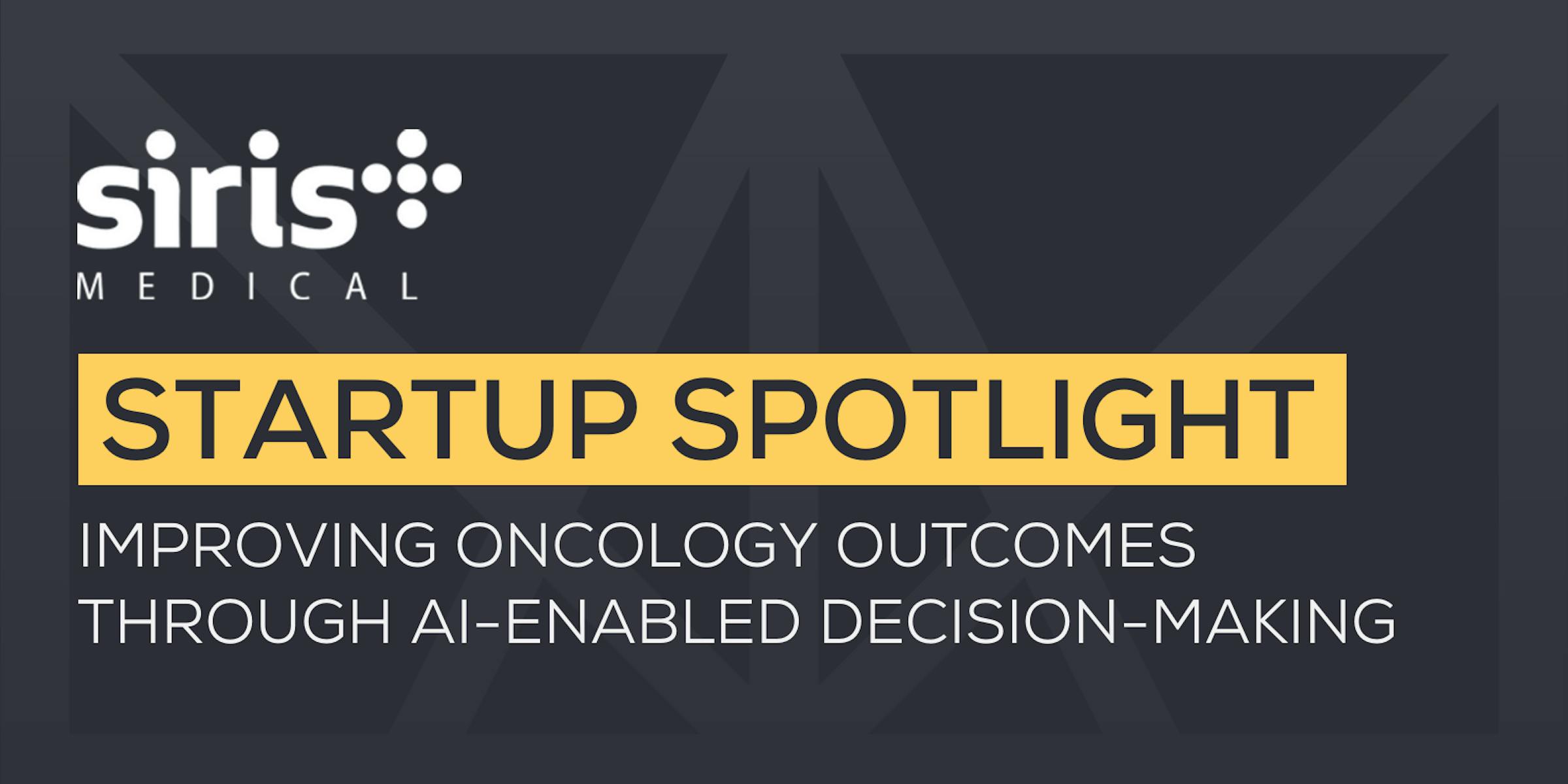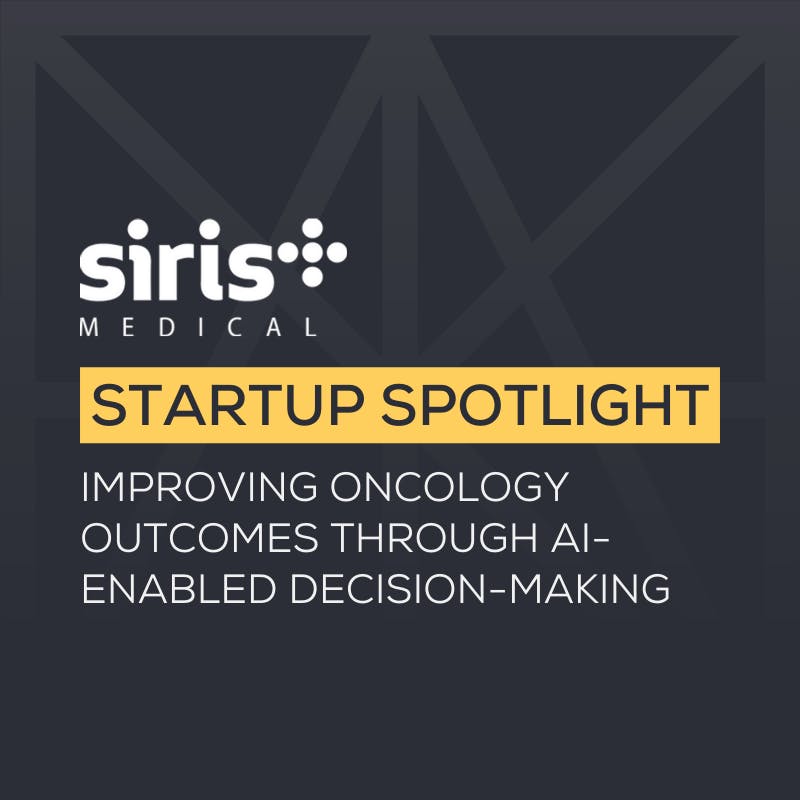MATTER Startup Spotlight: Siris Medical
Improving oncology outcomes through AI-enabled decision-making
According to the American Cancer Society, there were 16.9 million Americans with a history of cancer at the beginning of 2019, and the National Cancer Institute states that patients paid $16.22 billion in out-of-pocket costs for cancer care in 2019.
Colin Carpenter, founder and CEO of Siris Medical, is on a mission to alleviate this cost and improve treatment outcomes for people living with cancer. With Siris Medical’s platform, oncologists and payers can make AI-enabled decisions based on analysis and comparison of over 10 million clinical images and over 30,000 expert treatments, leading to better clinical outcomes and more cost-effective care delivery.
Continue reading for Colin’s insight on how Siris Medical’s solutions are transforming cancer care, his entrepreneurial journey and advice for other entrepreneurs.
Responses have been edited for length and clarity.
MATTER: What sparked your interest in healthcare?
Colin: “I’m passionate about healthcare innovation because of the effect it can have on people’s lives. Unfortunately, many families — including mine — have been touched by cancer in some way, so I’ve always wanted to do something to improve the lives of patients with cancer. That desire is what gets me out of bed in the morning, and it’s a mission that our whole team is deeply passionate about. It’s one thing to look at the metrics and see how many users the software has, but then I think about the impact of that use and I think, ‘Wow, that really helped a patient.’”
“It’s one thing to look at the metrics and see how many users the software has, but then I think about the impact of that use and I think, ‘Wow, that really helped a patient.’”
MATTER: What inspired you to start Siris Medical?
Colin: “When I was training at the Stanford Cancer Institute, I saw surgeon and medical device pioneer Dr. Thomas Fogarty speak. He shared how a catheter he designed in the late 1950s saved millions of limbs from amputation, and I was moved by one person’s ability to impact many lives.
“Throughout my training, I learned that there’s a lot of variability in cancer treatment. Not every patient is treated at the top centers, and even those that are treated at top centers are not necessarily receiving the best care. I started to consider how we could aggregate the best treatment experiences at all healthcare centers in the country and present that data to the oncology doctors in an efficient manner, enabling them to make impactful decisions regarding patient care. And I brought that idea to life with Siris Medical.”
MATTER: Tell me more about the solutions that Siris Medical provides.
Colin: “I believe that, generally, everyone wants to deliver the best, cost-effective care to patients, which is not unique to oncology — that’s across healthcare. The Siris Medical team came to the realization that if healthcare providers (who are the ones with the most knowledge and actually treat the patient) have a hard time creating the best treatment, it must be even more challenging for other stakeholders, like payers, to ensure the patient obtains the highest-quality and cost-effective care. We felt we could have significant influence if we could provide a transparent translation layer between stakeholders to provide the best care for the patient.
“Our products are based on creating that transparency and breaking down data silos to enable oncologists and payers to make informed decisions and ultimately improve the patient experience. Our clinical decision support tool helps oncologists understand how they or their colleagues treated a specific patient in the past, what has worked and what hasn’t worked, enabling oncologists to make intelligent decisions at the point of care. On the cost side, we have a product for payers that helps translate between the provider decision and the payer decision. The tool helps all stakeholders understand the right decisions and the right treatments for each patient. These two products work in concert to help patients obtain high-quality, cost-effective care.”
MATTER: Where do you see Siris Medical headed in five to 10 years?
Colin: “We are aggregating our data with each patient experience, so at this point we have a tremendous database consisting of tens of thousands of patients. But when we get to hundreds of thousands of patients, or even millions of patients, there’s significantly more value we could bring to oncology care and even expand to imaging, radiology and other treatments. In the next five to ten years, we want to build up our dataset so we can continue to offer value to providers, payers and, most importantly, patients.
“Beyond cancer treatments, I believe our technology is certainly translatable to other disease states, but there’s also a lot of room to grow in oncology. According to the National Cancer Institute, national costs for cancer care were over $200 billion in 2020. Additionally, cancer incidents, unfortunately, continue to increase in number, as it’s becoming more of a chronic disease as opposed to a terminal disease. So I truly believe there’s tremendous opportunity in oncology.”
MATTER: What results has Siris Medical seen?
Colin: “We recently had a few papers published. A few weeks ago, a paper with the Dana-Farber Cancer Institute showed the Siris Medical clinical decision support tool could reduce the risk of major adverse cardiac events and improve alignment between payers and providers. Another study found that when physicians used our tool, treatments improved: the risk of side effects decreased by fifteen-to-twenty percent.
“We also found a reduction by 85 percent in a misalignment, such as denial or overspend in care, between the payer and the provider. We found peer-to-peer review, used by payers to determine whether or not to uphold a denial of coverage for a claim, decreased by 60 percent.
“We also increased automation from about 10 percent to 94 percent. These benefits drive value by reducing operational and medical spend and ultimately creating value for patients through better care and cost outcomes; when the payer and provider both win, the patient wins.”
“When the payer and provider both win, the patient wins.”
MATTER: What obstacles or challenges have you faced as an entrepreneur, and how did you overcome them?
Colin: “My experience as an entrepreneur has been fun but very challenging. It helps to work in oncology because it pushes me to keep at it. But there are so many challenges entrepreneurs face when setting up a company — especially in healthcare.
“Healthcare providers and payers are large, complex organizations, and we’ve had to navigate the complexity and learn the ropes. For me, the fun part is working with experts that teach me about new fields. I’m an engineer by training, and sometimes I have tendencies to lean on my engineering skillset, but I find learning new business skills very rewarding, such as developing new partnerships. There’s no question that entrepreneurship is challenging — every day is challenging — but that means I’m making a difference and growing.”
MATTER: What advice do you have for other entrepreneurs?
Colin: “Networking is critical. I’m lucky that I love to network and meet new people, which has been an asset for me. Building your network is one of the most important skills an entrepreneur can have — you never know what opportunities will arise from it.
“Another piece of advice is to focus on value for the patient; focus on better outcomes and better care. This is the north star in healthcare. If you can do that, it motivates your team and your network who support your mission. In my opinion, it’s the best way to bring value to the healthcare field — you can deeply affect a person’s life by improving their treatment outcomes.”
“Focus on value for the patient; focus on better outcomes and better care. This is the north star in healthcare. If you can do that, it motivates your team and your network who support your mission.”
MATTER: After a year as a MATTER member, what value has MATTER brought you?
Colin: “We’re a remote team from MATTER, so when MATTER launched their global membership for entrepreneurs headquartered outside of the Chicagoland area, we joined that program. MATTER has done a great job regarding networking, bringing in experts and making referrals to help connect and build our business. I find it important for other MATTER members to keep the MATTER team up-to-date to enable the MATTER team to best help them.
“The mentors were incredibly helpful as we were launching into value for insurance companies. They helped us understand what questions to ask insurance companies in early conversations. And lastly, we’ve had fantastic introductions to investors. Our MATTER membership has been very valuable for Siris Medical.”
Interested in meeting a community of fellow entrepreneurs, industry leaders and investors? Learn more about opportunities for MATTER startup members.
About Siris Medical
Siris Medical is a pioneer in leveraging AI to help healthcare payers and healthcare practitioners provide better, faster, more cost-effective treatment. Its InsightRT PA platform integrates Prior Authorization into the provider’s clinical workflow, while its InsightRT CDS platform enables physicians to investigate treatment trade-offs that best align with the patient’s care needs while being informed of payer guidelines. Its historical treatment dataset of tens of thousands of expert oncology opinions help translate between patient-specific clinical data and payer/national guidelines. Please visit www.siris-medical.com for more information.
About MATTER
MATTER, the premier healthcare incubator and innovation hub, includes more than 300 cutting-edge startups from around the world, working together with dozens of hospitals and health systems, universities and industry-leading companies to build the future of healthcare. Together, the MATTER community is accelerating innovation, advancing care and improving lives. For more information, visit matter.health and follow @MATTERhealth.




